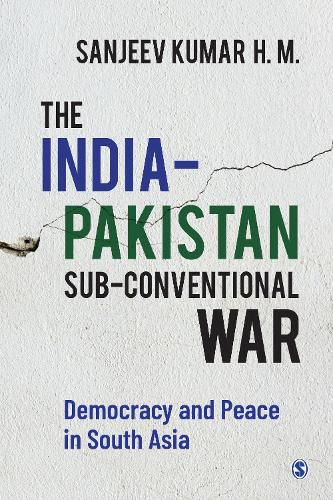Readings Newsletter
Become a Readings Member to make your shopping experience even easier.
Sign in or sign up for free!
You’re not far away from qualifying for FREE standard shipping within Australia
You’ve qualified for FREE standard shipping within Australia
The cart is loading…






The India-Pakistan Sub-conventional War: Democracy and Peace in South Asia argues that it is possible to map the functioning of democracy in South Asia by studying the role of the army in the political processes of Pakistan. In December 1988, Pakistan experienced a transition to democracy. Simultaneously, the military-intelligence complex was also able to take advantage of insurgency in Jammu and Kashmir and intensify the proxy war against India. Considering such a contradictory political situation, this book studies the deepening conflictual trajectory of the India-Pakistan relations since 1989. By analyzing this period of history, it argues that, in South Asia, the process of democratic transition and intensification of the sub-conventional war have happened concurrently. The book further argues that overt nuclear weaponization and the failure of nuclear deterrence allowed the sustenance of the India-Pakistan sub-conventional war.
By examining the subcontinental security predicament involving the two nuclear-powered adversaries, the book interrogates the democratic peace thesis. It deconstructs the thesis’ arguments in the geo-strategic context of the South Asian regional security architecture.
$9.00 standard shipping within Australia
FREE standard shipping within Australia for orders over $100.00
Express & International shipping calculated at checkout
The India-Pakistan Sub-conventional War: Democracy and Peace in South Asia argues that it is possible to map the functioning of democracy in South Asia by studying the role of the army in the political processes of Pakistan. In December 1988, Pakistan experienced a transition to democracy. Simultaneously, the military-intelligence complex was also able to take advantage of insurgency in Jammu and Kashmir and intensify the proxy war against India. Considering such a contradictory political situation, this book studies the deepening conflictual trajectory of the India-Pakistan relations since 1989. By analyzing this period of history, it argues that, in South Asia, the process of democratic transition and intensification of the sub-conventional war have happened concurrently. The book further argues that overt nuclear weaponization and the failure of nuclear deterrence allowed the sustenance of the India-Pakistan sub-conventional war.
By examining the subcontinental security predicament involving the two nuclear-powered adversaries, the book interrogates the democratic peace thesis. It deconstructs the thesis’ arguments in the geo-strategic context of the South Asian regional security architecture.